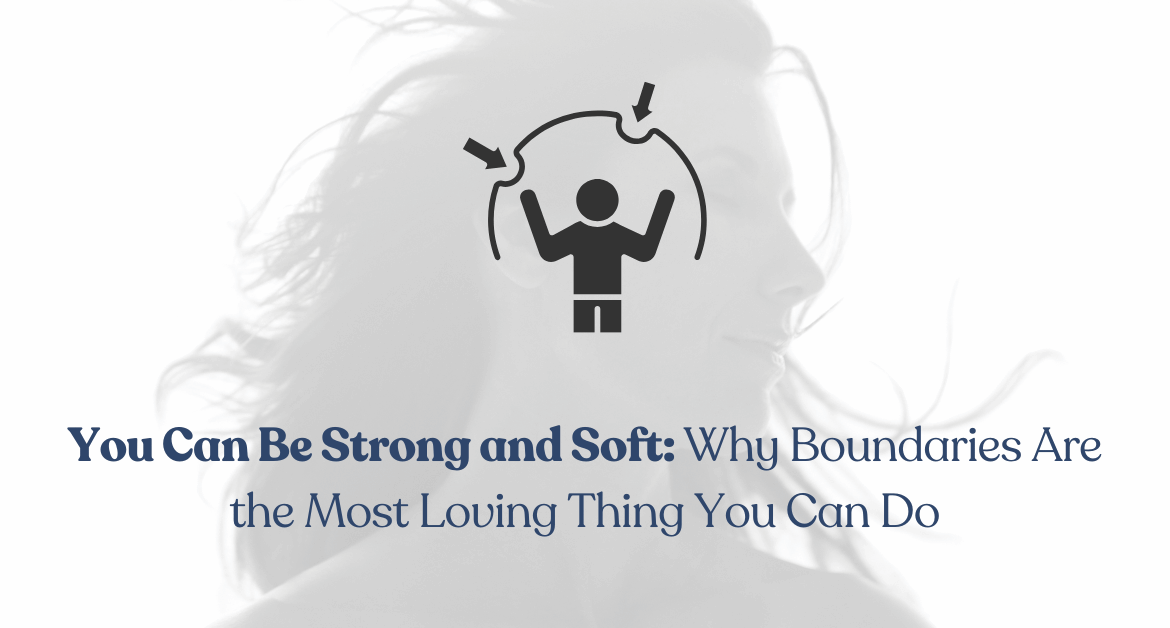

You Can Be Strong and Soft
Why Boundaries Are the Most Loving Thing You Can Do
As a practitioner, your work is about helping others. You hold space, you listen, you support. But what happens when “helping” turns into overextending? When clients assume you’ll always be available, ask for extra time, or expect you to bend your own boundaries?
You want to be compassionate, but instead, you end up exhausted, stretched too thin, and maybe even a little resentful.
So how do we find the balance? How do we honour ourselves while still showing up fully for others?
Because true heart-centred leadership isn’t about saying yes to everything. It’s about knowing exactly where to draw the line.
The Misconception: Why People Think Boundaries and Compassion Can’t Coexist
Somewhere along the way, we were taught that being caring means always saying yes. That being generous means overextending ourselves. That being a good person means making endless exceptions.
But the truth? Over-giving doesn’t help anyone. When we don’t set boundaries, we don’t just drain ourselves—we fail the very people we’re trying to support. A practitioner running on empty isn’t truly present. A healer who ignores their own limits can’t hold space properly. A coach who never says no ends up burned out and unable to serve at all.
Boundaries aren’t barriers. They are the foundation that allows us to give from a place of strength, rather than depletion.
The Dilemma: What Would You Do?
Imagine you’re a holistic practitioner. A client books a one-on-one session with you. They’ve worked with you before—maybe they attended a workshop or a group program—and now they’re ready for deeper support.
Your prices are clearly listed, and you show up fully, offering your time, energy, and expertise. The session goes well. They express gratitude. But when it comes time for payment, something shifts. They hesitate. Maybe they weren’t expecting it to be that much. Maybe they assure you they’ll sort it soon, but days or even weeks pass with no payment.
Now you’re in a tough spot.
Do you let it go, hoping they’ll do the right thing—but knowing that if they don’t, you’re left undervalued?
Do you remind them, risking them feeling uncomfortable or defensive?
Do you offer a discount or let it slide, even though it compromises your integrity?
No matter what you choose, you will most likely feel the tension—the pull between wanting to be kind and needing to uphold your own worth.
So here’s the real question: At what point does compassion turn into self-sacrifice?
Boundaries Are a Form of Deep Care
When we set boundaries, we’re not just protecting ourselves—we’re creating clarity, trust, and mutual respect. We’re saying:
“I respect you enough to be honest about what I can and cannot do.“
Without boundaries, relationships—whether professional or personal—become unclear and unsustainable. Overextending ourselves leads to exhaustion, resentment, and ultimately, disconnection.
So instead of seeing boundaries as walls that separate, what if we saw them as bridges that create stronger, healthier connections?
The Well That Runs Dry
Think of yourself as a well. People come to you for support, guidance, and energy. It’s what you do—you hold space and offer something valuable that nourishes others.
But what happens when you never take time to replenish? If you keep giving and giving, without ensuring an equal exchange, the well eventually runs dry.
And when that happens, no one benefits. Not you. Not the people you serve.
“Setting boundaries isn’t about being unkind—it’s about ensuring there is always enough to give, without depleting yourself in the process.“
How to Start Setting Boundaries in a Heart-Centred Way
It’s not about shutting people out. It’s about making sure the way you give is sustainable and honouring to both you and the people you serve.
- Your no is just as important as your yes. It’s okay to choose when, how, and who you give your energy to.
- The clearer you are upfront, the fewer misunderstandings happen. Set expectations early.
- Not everyone will like it, and that’s okay! Believe it or not, your worth isn’t measured by how many people approve of your boundaries.
- Check in with yourself often—are you giving from a place of fullness or depletion?
Boundaries and Compassion: Two Sides of the Same Coin
Boundaries and compassion aren’t opposites—they work together. They are like two hands that hold each other, creating a balance between giving and preserving. If we can integrate them, we can lead, love, and create from a place of strength, rather than burnout.
Holding space for others doesn’t have to mean losing yourself in the process. It can be a place where you stand firmly in your truth while inviting others to do the same.
So tell me, how do you show up in your relationships, your work, and your leadership? What has this stirred in you about the way you honour both yourself and those you serve?
If you’re ready to explore the edges of heart-centred leadership—the balance between strength and softness—I’ll be hosting an exclusive three-day intensive in October for those committed to playing at the highest level—leaders ready to step into their power with integrity and unwavering clarity.
In an intimate setting, we’ll dive deep into what it truly means to lead, set boundaries, and embody heart-centred leadership.
If you’re ready to play full out, I invite you to join me.
PLUS, whenever you’re ready, there are 2 ways we can work together:
- Want to learn to lean into the art of Quiet Influence? Join me at the next intensive.
- Sign up for one of our current courses at ASHC and get taught by my team of advisors and me. All our courses are internationally and nationally industry-approved and will equip you with all the tools to open up your own professional private practice.
- Need help with standing in your power as a woman in leadership? Apply for one of only three spots as my private client.
REFERENCES:
- Catalyst. (2020). Why diversity and inclusion matter: Financial performance. https://www.catalyst.org/research/why-diversity-and-inclusion-matter/
- European Institute for Gender Equality. (2021). Gender equality index 2021: Sweden. https://eige.europa.eu/gender-equality-index/2021/country/SE
- Forbes. (2020). Why women don’t always support other women (And how to fix it). https://www.forbes.com/sites/ellevate/2020/02/10/why-women-dont-always-support-other-women-and-how-to-fix-it
- Harvard Business Review. (2019). Research: Women score higher than men in most leadership skills. https://hbr.org/2019/06/research-women-score-higher-than-men-in-most-leadership-skills
- McKinsey & Company. (2020). Women in the workplace 2020. https://www.mckinsey.com/featured-insights/diversity-and-inclusion/women-in-the-workplace
- Victoria State Government. (n.d.). Gender inequality affects everyone. https://www.vic.gov.au/gender-inequality-affects-everyone
- Workplace Gender Equality Agency. (2022). Australia’s gender equality scorecard. https://www.wgea.gov.au/publications/australias-gender-equality-scorecard



